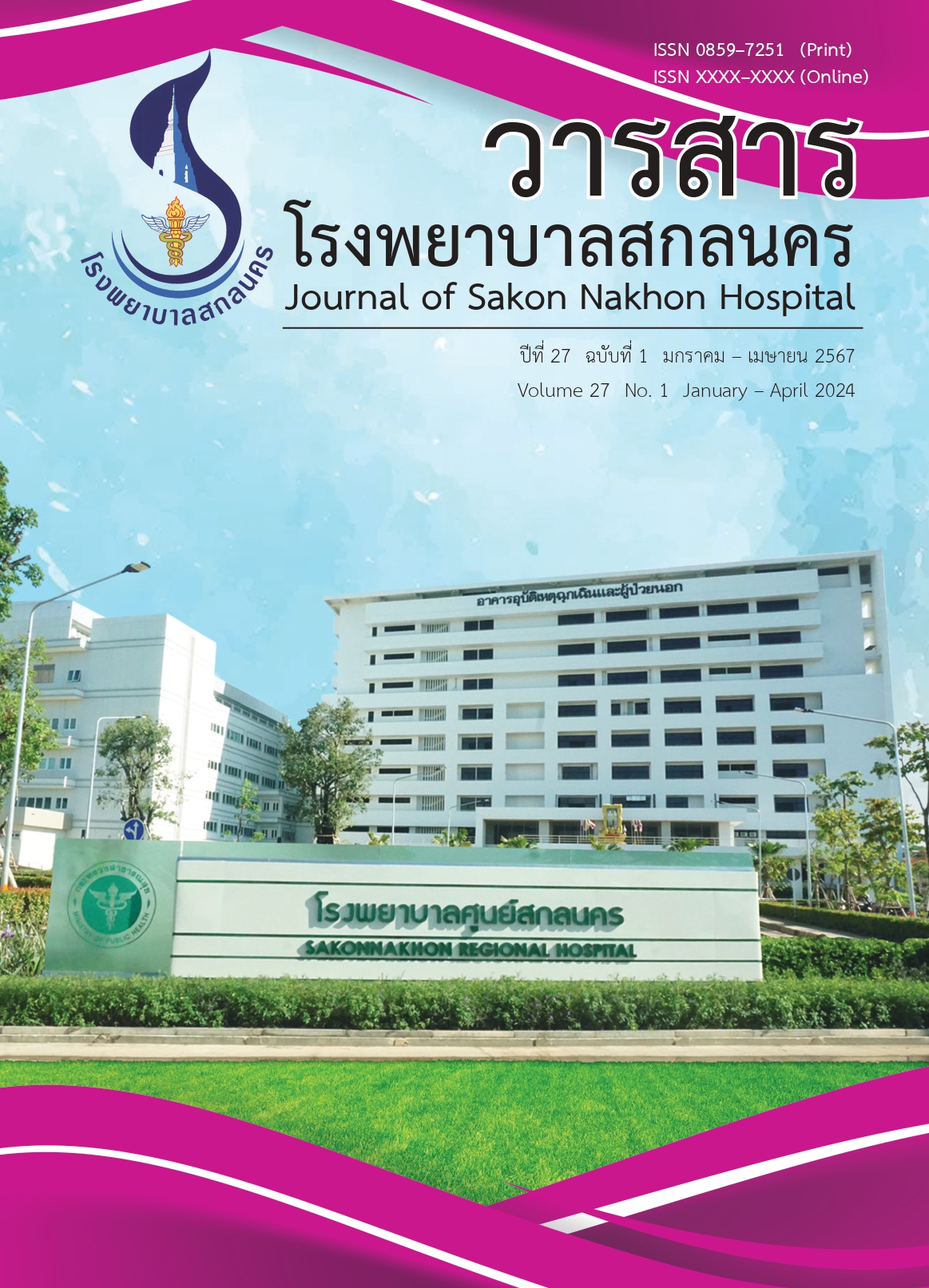Nursing Care for Patients with Pneumonia Caused by COVID–19 Infection with Respiratory Failure: 2 Case Studies
Keywords:
Pneumonia, Respiratory failure, COVID–19 infection, Nursing careAbstract
The COVID–19 infection is a health problem that severely affects the respiratory system leading to pneumonia, respiratory failure and death. It increases patient’s hospitalization days, may lead to adverse events, and incurs higher treatment costs. This study aimed to study the implementation of nursing care according to FANCAS nursing concepts together with Orem’s self–care theory in nursing care for two cases of patients with pneumonia and respiratory failure caused by COVID–19 infection, treated in the new infectious disease intensive care unit of Sakon Nakhon hospital between February,
2023 and July, 2023. Data collection tools included record form of important symptoms, laboratory results, treatment, nursingcare reviewedfrom medical records, patientsandtheir relatives toestablish diagnoses, nursing care plan, summarize, and outcomes evaluation.
The two cases studies had similarities in disease pathophysiology and progression. They were the elderly patients with comorbidities and immunocompromised status. When FANCAS nursing concepts and Orem’s self–care theory as a nursing system were implemented to assist in patient care in order to meet the needs of patients who unable to care for themselves, addressing self–care deficits in physical, psychological, emotional and social aspects through comprehensive substitution system in
which all nursing care activities were performed by nurses, the partially substitution system which the activities were performed collaboratively between nurses and patients and the support and education system which nurses played the role in teaching and guiding the patients. Both cases studies did not develop complications such as deterioration during treatment, acute respiratory failure, severe
bloodstream infections, lung rupture, increased lung rupture, or COVID–19 spread. The duration of hospitalization in the new infectiousdisease intensive careunit was10daysaccordingtothe treatment plan.
References
ดุสิต สถาวร, ครรชิต ปิยะเวชวิรัตน์, และสัณฐิติโมรากุล. COVID and crisis in critical care. กรุงเทพฯ: สมาคมเวชบำบัดวิกฤตแห่งประเทศไทย; 2563
กรมควบคุมโรค กระทรวงสาธารณสุข. โรคติดเชื้อไวรัสโคโรนา 2019 (COVID–19) [อินเทอร์เน็ต]. 2564 [เข้าถึงเมื่อ 20 ตุลาคม 2565]. เข้าถึงได้จาก: https://ddc.moph.go.th/viralpneumonia/index.php
Guo YR, Cao QD, Hong ZS, Tan YY, Chen SD, Jin HJ, et al. The origin, transmission and clinical therapieson coronavirus disease 2019(COVID–19) outbreak–an updateon the status. Mil Med Res2020;7(1):1–10.
สุทัศน์รุ่งเรืองหิรัญญา. Approach to Hypoxemia. กรุงเทพฯ บียอนด์เอ็นเทอร์ไพรซ์; 2563 หน้า. 173–89.
สุจิตรา ลิ้มอำนวยลาภ. การพยาบาลผู้ป่วยที่มีภาวะเจ็บป่วยวิกฤต. พิมพ์ครั้งที่ 9. ขอนแก่น: คลังนานา;2559.
Holloway N M. Nursing the Critically ILL Adult. California: Addison–Wesley Publishing; 1979.
Nursing theory. Dorothea Orem – Nursing theorist [Internet]. [Cited 2020 Oct 3]. Available from: https://www.nursing –theory.org/nursing theorists/Dorothea–E–Orem.php
จันท์ทิรา เจียรนัย, และศรัญญา จุฬารี. แนวคิดพื้นฐานของศาสตร์ทางการพยาบาล. นครราชสีมา: สํานักพิมพ์ มหาวิทยาลัยเทคโนโลยีสุรนารี; 2562.
Marik PE, Linde–Zwirble WT, Bittner EA, Sahatjian J, Hansell D. Fluid administration in severesepsisandseptic shock, patternsandoutcomes:an analysisofalarge nationaldatabase. Intensive Care Med 2021;43(5):625–635.
สรภพ ภักดีวงศ์. More Understanding Covid: Pneumonia/ ARDS. ใน: ดุสิต สถาวร, ครรชิต ปิยะเวชวิรัตน์, สัณฐิติ โมรากุล,และภูษิต เฟื่องฟู, บรรณาธิการ. COVID andcrisisin criticalcare. กรุงเทพฯ:สมาคมเวชบำบัดวิกฤตแห่งประเทศไทย; 2564. หน้า 307–313.
กรมการแพทย์ กระทรวงสาธารณสุข. แนวทางปฏิบัติในการดูแลผู้ป่วยวิกฤตในสถานการณ์การระบาดของ COVID–19[อินเทอร์เน็ต].2563[เข้าถึงเมื่อ 20 ตุลาคม 2566]. เข้าถึงได้จาก: https://dmta.dms.go.th/manualdmta/MN_Policy/cpg/CPG–13.pdf
ณัฏฐิดา โอวัฒนาพานิช, สัณฐิติโมรากุล, สหดล ปุญญถาวร, ครรชิต ปิยะเวชวิรัตน์, และดุสิต สถาวร The Seamless critical care. กรุงเทพฯ: สมาคมเวชบำบัดวิกฤตแห่งประเทศไทย; 2566.
วิจิตรา กุสุมภ์.การพยาบาลผู้ป่วยวิกฤต : แบบองค์รวม (Clinical care nursing : A holistic approach). พิมพ์ครั้งที่7 . กรุงเทพฯ: สามัญนิติบุคคล สหประชาพาณิชย์; 2565.
จันทร์เพ็ญ เนียมวัน, เดือนแรม เรืองแสน, และวราทิพย์แก่นการ. สมรรถนะพยาบาลวิชาชีพในการพยาบาลผู้ป่วยใช้เครื่องช่วยหายใจ. ว. การพยาบาลและการดูแลสุขภาพ 2563;38(1):1–14.
ศุทธิจิต ภูมิวัฒนะ.การพยาบาลด้วยหัวใจความเป็นมนุษย์ในผู้ ป่วยที่ใช้เครื่องช่วยหายใจชนิด invasive: จากแนวคิดสู่การปฏิบัติ. วชิรสารการพยาบาล 2563;22(1):70–91.
เสาวภา ทองงาม. การพยาบาลผู้ป่วยโรคโควิด–19ในหอผู้ป่วยแยกโรค โรงพยาบาลศิริราช. เวชบันทึกศิริราช 2563;13(3):222–231.
จันทร์ฉาย มณีวงษ์, การพยาบาลด้านการป้องกันและควบคุมการ แพร่กระจายเชื้อในโรงพยาบาล. กรุงเทพฯ: โรงพิมพ์แห่งจุฬาลงกรณ์มหาวิทยาลัย; 2562. หน้า 53–60.
อภิญญา กุลทะเล. การป้องกันภาวะทุพโภชนาการใน ผู้ป่วยวิกฤต. ใน: วิจิตรา กุสุมภ์, ธนันดา ตระการวณิชย์, ภัสพร ขำวิชา, ไพบูลย์โชติพรัตน์ภัทร, สุนันทา ครองยุทธ, รัตนา จารุวรรโณ, และคนอื่นๆ, บรรณาธิการ.การพยาบาลผู้ป่วยภาวะวิกฤติ:แบบองค์รวม. พิมพ์ครั้งที่6. กรุงเทพฯ:สหประชาพาณิชย์;2560. หน้า521–524.
รัฐพล อุปลา. คู่มือการตรวจวินิจฉัยโรคติดเชื้อไวรัสโคโรนา 2019 (COVID–19). พิมพ์ครั้งที่ 3. ใน: สุทัศน์ รุ่งเรืองหิรัญญา, บรรณาธิการ. กรุงเทพฯ: บียอนด์เอ็นเทอร์ไพรซ์; 2560. หน้า 173–89.
Raoof S, Nava S, Carpati C, Hill NS. High–Flow, Noninvasive Ventilation and Awake Proning in Patients with Coronavirus Disease 2019 With respiratory. Chest 2020;158(5):1992–2002.
Downloads
Published
How to Cite
Issue
Section
License
บทความที่ตีพิมพ์ถือว่าเป็นลิขสิทธิ์ของวารสารโรงพยาบาลสกลนคร การคัดลอกเพื่อพัฒนาเชิงวิชาการต้องได้รับการอ้างอิงอย่างถูกต้อง






